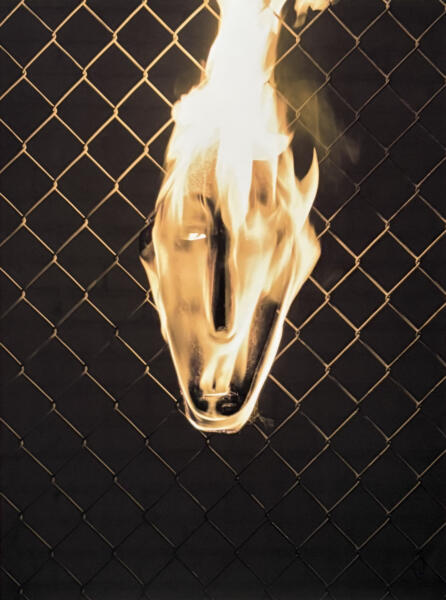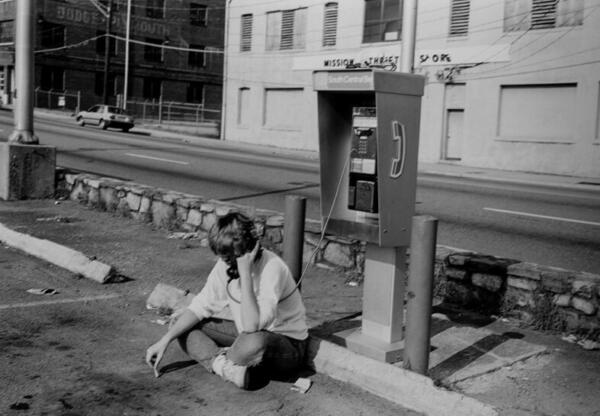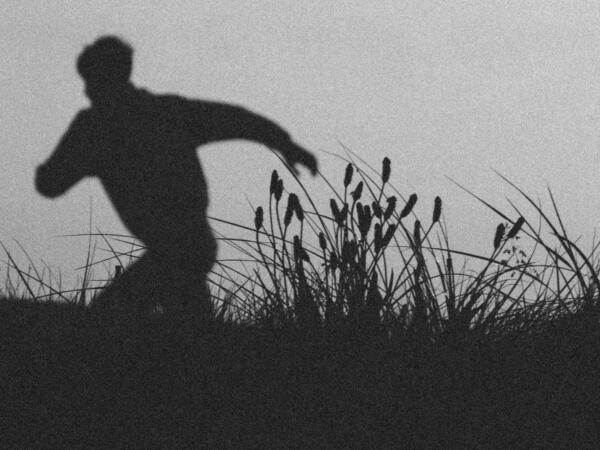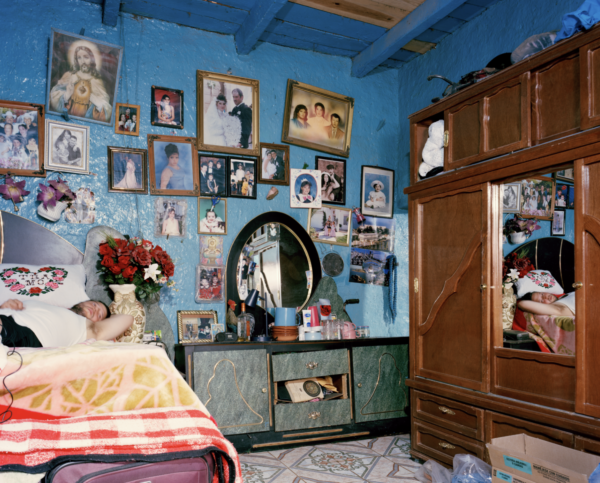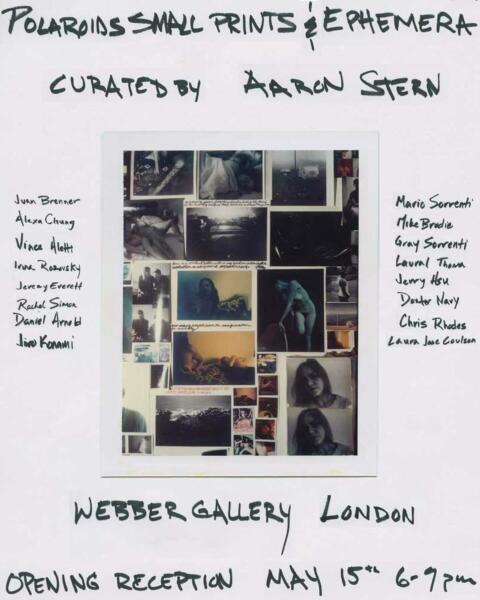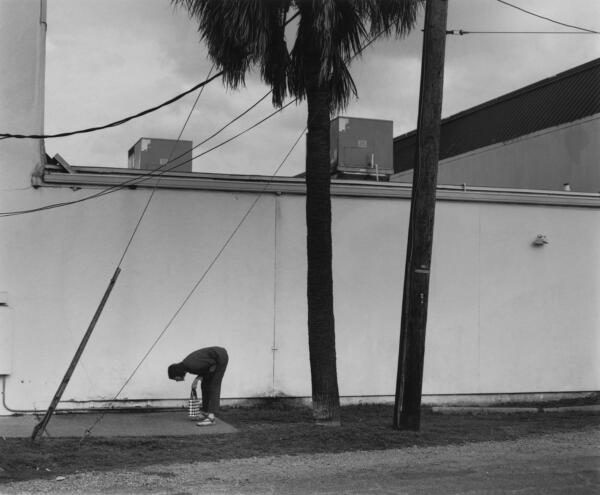- Past
-
Show LA 2026,
Awol Erizku, David Alekhuogie, Unkle Luc, Zora J Murff | Booth 2
![]()
-
Aaron Stern,
Decades Curated by Aaron Stern
![]()
-
Robbie Lawrence,
Mann
![]()
-
Timon Benson,
Voice of Matter
![]()
-
Yale MFA Photo,
First Breath Second Sight
![]()
-
Aaron Stern,
POLAROIDS, SMALL PRINTS and EPHEMERA
![]()
-
Yorgos Lanthimos,
Photographs
![]()
-
Webber Gallery,
Photo London 2025 Stand G17
![]()
-
Peter Tomka,
Bachelor Suite
![]()
-
Keisha Scarville,
lick of tongue, rub of finger, on soft wound
![]()
General View 25.05–23.07.17
, General View
25.05–23.07.17
The most seductive aspect of photography, even still, is its apparent lack of artifice. You point the camera at something and the resulting image seems to duplicate its appearance without much visible mediation. The medium is a technology for reproduction. But even more than what something looks like – when photographed – what pictures also reproduce, endlessly, are the ideas we attach to the things we photograph; the reproduction of photography is, fundamentally, a reproduction of ideas, of how something is seen and not merely what it looks like. It is a means of encoding assumptions about the world, within the descriptive capacity of the medium, so that they appear inevitable, a ‘natural’ attribute of the subject. A striking paradox of digital photography is that the more obvious the limitations of the process are (noise, pixellation, other artefacts) the more unmediated the picture seems, precisely because most digital photographs otherwise offer such perfect surfaces and seem in this way to deceive.
Thomas Albdorf’s General View is a development of his fascination with the complex relationship between photography as a way of picturing the world around us and those conventions that shape our experience of seeing, which are increasingly influenced by digital technology. It is a work ‘about’ a place he has never been to, the archetypal landscape of Yosemite National Park, but really considers the way photography is used to package and indeed even to commodify a set of experiences. It’s almost as good as being there.
Formally, the work is a mix of strategies, combining the ‘sculptural’ direction of Albdorf’s earlier work, where objects and scenes are made to be photographed, with interventions in the malleable digital space of the photographs, sometimes both at once. Many of these interventions are rather crude, deliberately calling attention to themselves. Specifically, though, the artefacts that Albdorf makes use of (or actually, recreates) here are those we might associate with a uniquely contemporary experience, that of looking at distant places on Google Street View and other, similar applications. He either inserts the familiar blurs and rendering glitches into his own photographs or collects examples of them directly from the application. It isn’t that he wants to normalise them, but rather to introduce the habit of recognising how they function in the visual space of the rendered image and to consider what they imply about the process by which these images are arrived at.
These are a reminder that despite seeming ‘natural,’ both the landscape being depicted and the immersive experience of viewing it are in fact highly constructed. Our understanding of the landscape, which just seems to be there, is a product of cultural memory, of all the ‘views’ we’ve seen of it already. This isn’t a recent development, by any means; from its inception Yosemite was commodified photographically. What appears to have changed is the extent to which digital technology has collapsed the distance between the viewer and the view. Or at least it gives the impression of doing so, because how this work concentrates on the breaks and fractures of the viewing experience suggests that the effort of maintaining this immersive illusion is still at the cost of our capacity to authentically encounter a place, albeit one that is effectively made to be seen. Of course, nobody actually thinks this experience is the same as seeing a place – how could they – it’s just that, as Albdorf knows, we have been so accustomed to frame our understanding of the world in terms of consuming images that to extend this consumption from static photographs to the dynamic rendering of a screen-based interface is not a huge leap. It is a difference in degree rather than kind.
Creating that experience, which is a synthetic one, dependent on rendering multiple images into a single visual entity, is ostensibly about hiding the joins, so Albdorf pays close attention to where they do appear, making images that treat these glitches as an aesthetic resource in their own right. Further, this source material is not ‘authored’ in the conventional sense; it is not the direct product of a human decision, but the result of software algorithms and specialised cameras. Beyond the constraint of ‘photography’ itself then, there is the working of some even more obscure process determining how something should be seen, one that, in common with other ways of picturing the landscape, naturalises its own construction, so the significance of Albdorf using its glitches is, on the one hand, to draw our attention to them, to show how they have become familiar – part of the ‘view’ almost – and, on the other, to resist this integration, to show the artifice that underpins this way of seeing.
Of course, all ‘views’ are artificial, they are something we construct in different ways, and framing the landscape has a long history. In fact, it might be true to say that it doesn’t exist as a ‘landscape’ until it has been framed in some way; without that it’s just terrain. A ‘general’ view, then, is simply one whose framing (both visual and conceptual) most closely matches those ideas we have about whatever is being pictured. The proliferation of images and how they are circulated creates an economy of such ideas; it is no accident that Albdorf chose Yosemite as his subject. He didn’t need to go there to ‘see’ it – the park has been photographed enough already. By making use of the prevailing ideas about how it is pictured he could, essentially, remake the kinds of view those ideas produce.
These pictures look like other pictures because of how they reproduce (as visual codes) the cultural assumptions that surround certain kinds of landscapes. Here as elsewhere he sardonically duplicates the conventional aspects of these images with make-shift studio constructions in order to demonstrate how regimented they actually are. Albdorf is a landscape photographer in so far as ‘landscape’ is essentially a set of pictorial conventions he can enter into and wilfully deconstruct. By pairing his own photographs with the imagery derived from Street View he also suggests an unexpected continuity between these different ways of making the landscape visible, of framing a view, where we might otherwise imagine there has been a fundamental break.
While he is far from the first artist to make use of Street View, the way in which Albdorf has incorporated its aesthetic vocabulary into his own images is a significant departure, as is how he has been able to relate what we might call the Street View ‘experience’ to older, more established ways of picturing the landscape. His subject, in that sense, is how a set of received ideas are visually mediated through photographic (increasingly digital) technology. He asks whether or not our experience – and understanding – of the world is somehow different because we can now view it is this way.
There is perhaps no easy conclusion to be drawn here, but within the algorithmically determined ‘black box’ of these applications he is able to locate some kind of shared vocabulary with the ways in which the landscape – a specific landscape – has been pictured. It seems as is if the place itself has been overwritten by the conventionality of those pictures, a stream of photographic reproduction, and now it can hardly be seen at all, except in such terms. By dismantling and recombining the visual codes that make up both the conventions of ‘beautiful’ landscape photography and the immersive experience of Street View as they relate to the same place he is able to expose the fundamental relationship between the imagery we consume and the relationship we have to the world around us, one that definitely shifts as technology changes, sometimes dramatically so, but whose terms are not really altered. After all, there’s no ‘landscape’ without a frame.
Text by Darren Campion






















